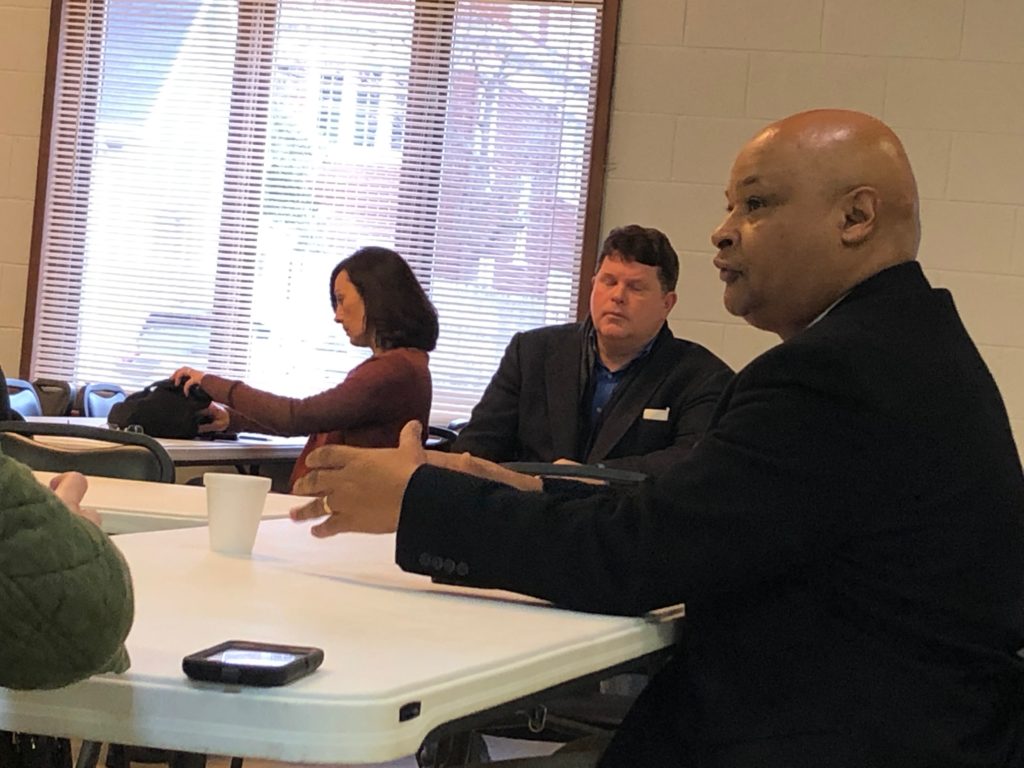By Crystal Good
For W.Va. Press
CHARLESTON, W.Va. — Criminal Justice Reform & Reentry Day kicked off at Trinity Lutheran Church with a discussion “Closing the School-Yard to Prison Yard Pipeline.
Criminal Justice Reform and Reentry Day engages formerly incarcerated leaders, their families, students, statewide advocacy groups, and faith leaders to voice support for legislation that would reduce recidivism as well as the number of people incarcerated.

Pastor Mathew J. Watts led a discussion on the West Virginia Legislature’s proposed Senate Bill 723 – Reducing School Suspensions”.
Senate Bill 723 is on first reading in the West Virginia House of Delegates today.
Watts greeted the room that included concerned community members, local politicians and NAACP members, representatives from non-profit organizations and an encouraging group of 7th and 8th graders from Mountaineer Montessori School.
Watts explained that for 35 years he’s been trying to figure out the cause of overrepresentation of juveniles in the West Virginia justice system. The majority of juveniles who are black and poor whites.
According to the Annie E. Casey Foundation, West Virginia and Idaho lead the nation in juvenile incarceration rates.
Watts said, “The data tells a clear story. The root of the problem is happening in broad daylight. 20,000 kids are being suspended every year from schools and no one is talking about that as a concern.”
“Senate Bill 723 is a modest bill, a one paragraph bill, that calls for the State Board of Education to collect, analyze suspension data and develop some kind of program for how they think the situation can be addressed,” Watts said,
He explained SB 723 developed from a complicated history that may have roots back to 1956 with desegregation. He said school suspensions often end with youth incarceration: “School suspensions lead to unexcused absences that often develop into truancy that is an incarceration-able offense.”
Watts fully supports and encourages SB 723 but said there is a catch. The legislature will not review the data until 2022. He applauded Senator Baldwin for trying to amend the bill allowing for a prompt 2021 review of the data.
Watts expressed the urgency of helping the 20,000 students affected by school suspensions, “Now,” he said, “but, you take what you can get. I’m glad the issue, and SB 723, is getting attention from the public, school board and legislature.”
Watts explained in 2019 the State Board of Education code 4373 was amended and provides for principals to elevate level one offenses to level three offenses and allows the principal to suspend the student with impunity. He said there is little transparency in the suspension process.
The history of the suspension and truancy crisis was highlighted in 2015 as West Virginia made national headlines as a state that funnels kids from schools to prisons.
A Pew Charitable Trust study and a Juvenile Justice Task Force formed by Governor Earl Ray Tomblin resulted in a piece of legislation in 2015 – S.B. 393 – that sought to reform the juvenile justice system to specifically improve policies and reduce the placement of low-level youth offenders in state-funded facilities.
Watts said, “Five years have passed since this legislation and nothing has been done. They (state board and legislature) still don’t seem to understand how critical this issue is. The suspension of children is the trigger that moves children toward prison.”
Watts explained that suspension leads to the 20 percent of West Virginia kids who missed at least 10 percent of the school days, based on a report by former state superintendent Dr. Steve Paine. School suspension absences are unexcused and count toward truancy.
“Truancy is the trigger that leads youth to the court system. Until we can turn the dial back on suspension, we will not see an increase in labor force participation as many of the suspended youth will have limited workforce participation .”
Watts said, “ A large number of 16-24 year olds, almost 60,000, are not in school and not working.”
He said there is great need for SB 723 but added, “We need to be taking steps to help students now. We owe them the help they need now because thousands in the school system today are headed for drop out tomorrow.”
Students at the events had opinions on the problem:
Soleil Gloss, 12, said she never made the connection of school suspension to juvenile incarceration but that she wasn’t surprised. She questioned how the power to suspend students is handled, and said, “There is always one person in power and that’s the Principal.”
Amal Faridi, 14, said she changed her mind about the need for school suspensions after hearing the data. She believed in harsh punishments but now questioned how the school system … could offer more help to students facing disciplinary actions.
Aidan Rogers, 13, said, “Suspending a kid is not a light thing.” He suggested that the school look at a jury of teachers to decide who is suspended.
Another student, 14, said he was suspended several times while in public school for reasons he didn’t think were so bad but said he was able to get help from external sources to change his behaviors.





